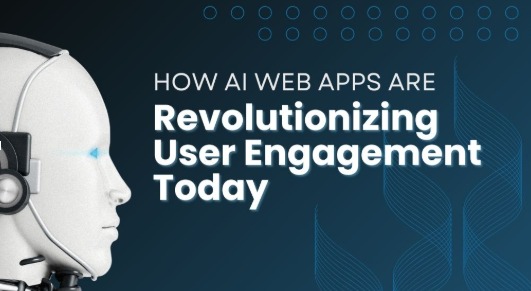Artificial intelligence is transforming the way web applications interact with users, making online experiences more personalized, efficient, and engaging than ever before.
Businesses are now leveraging AI to understand user behavior, predict preferences, and deliver tailored content that keeps visitors coming back.
From intelligent chatbots that provide instant support to recommendation engines that suggest the perfect product, AI is reshaping how users engage with digital platforms.
What Are AI-Powered Web Applications?
AI-powered web applications are intelligent platforms that use artificial intelligence to enhance user experiences, streamline processes, and provide actionable insights. These web apps integrate machine learning, natural language processing, and automation to understand user behavior and respond in real time.
By leveraging AI integration, businesses can create intelligent web apps that adapt dynamically to user needs, making digital interactions smoother and more engaging. Machine learning web applications continuously learn from user data, improving personalization and efficiency over time.
Key capabilities include:
- Personalized user experiences
- Automated workflows
- Predictive analytics
- Chatbots and virtual assistants
Key Features of AI Web Apps
Personalization and Recommendation Engines
AI web applications leverage behavioral analytics, collaborative filtering, and content-based recommendation algorithms to deliver highly tailored content to individual users.
By analyzing clickstream data, session duration, and interaction patterns, these intelligent web apps dynamically suggest products, articles, or services that align with user intent.
Personalized recommendation engines not only increase conversion rates but also improve customer lifetime value by presenting contextually relevant options at the right time.
The experts at Halo Digital helped one of their clients in Baton Rouge implement a custom recommendation system through custom web app development Baton Rouge, resulting in significantly higher engagement and conversions by using AI-driven personalization strategies.
Predictive Analytics and Insights
Machine learning web applications use predictive modeling, regression analysis, and classification algorithms to forecast user behavior, segment audiences, and identify trends.
By applying sentiment analysis, churn prediction, and propensity scoring, businesses can anticipate user needs, optimize marketing campaigns, and make data-driven decisions that enhance retention and engagement.
AI Chatbots and Virtual Assistants
AI-driven chatbots and virtual assistants employ natural language understanding (NLU), intent recognition, and context-aware dialogue management to provide real-time support.
These intelligent assistants handle multi-turn conversations, deliver proactive notifications, and capture structured user data for personalization.
Integrating voice recognition or conversational AI further enhances engagement while reducing human intervention.
Automated Workflows
AI web apps automate repetitive and rule-based tasks using RPA (Robotic Process Automation), intelligent task orchestration, and event-driven triggers.
From automated data extraction to dynamic content updates and real-time notifications, AI workflows increase operational efficiency while maintaining consistency.
This allows teams to focus on strategic decisions and creative tasks instead of manual, repetitive processes.
Benefits of AI Web Apps on User Engagement
AI web applications provide measurable improvements in how users interact with digital platforms. By analyzing user intent, predicting behavior, and delivering contextually relevant content, these intelligent web apps increase engagement and drive tangible business outcomes.
With predictive analytics, personalized recommendations, and automated support, AI enhances every stage of the user journey, ensuring that visitors are more likely to convert and remain loyal over time.
Key benefits include:
- Higher conversion rates due to tailored content and recommendations
- Improved retention and loyalty by understanding user behavior and preferences
- Reduced bounce rates through context-aware navigation and dynamic interfaces
- Increased time on site as users engage with AI-driven features and relevant suggestions
Industries Leveraging AI Web Apps
E-commerce
AI web apps in e-commerce use recommendation engines, sentiment analysis, and predictive analytics to deliver personalized product suggestions. These intelligent web applications optimize search results, enhance conversion rates, and provide real-time promotions based on user intent and browsing history.
Healthcare
Healthcare platforms leverage AI to provide virtual assistants, automate appointment scheduling, and deliver personalized health insights. Machine learning web applications analyze patient data, detect anomalies, and improve engagement by offering timely reminders and health recommendations.
Finance
Financial services use AI-driven predictive analytics, fraud detection, and personalized portfolio recommendations. Intelligent web apps in finance monitor transaction patterns, assess user risk profiles, and provide contextually relevant financial advice, improving retention and user trust.
Education and eLearning
AI web apps in education deliver adaptive learning paths, personalized content, and real-time feedback. Natural language processing and behavior analytics help create engaging experiences that improve knowledge retention and course completion rates.
Travel and Hospitality
Travel platforms use AI to offer personalized itineraries, predictive pricing, and chat-based customer support. These web apps enhance user engagement by anticipating preferences, providing relevant recommendations, and streamlining bookings.
How AI Enhances Web App UX
AI web applications are transforming user experience by combining predictive intelligence, context-aware personalization, and adaptive interfaces. By analyzing behavioral data, clickstream analytics, and session patterns, AI-driven web apps can anticipate user needs and deliver highly relevant content. This results in smoother navigation, higher engagement, and increased retention.
Dynamic Content Display
Intelligent web apps leverage real-time behavioral analytics, reinforcement learning, and contextual content algorithms to modify content based on user preferences, interaction history, and current session data. Dynamic content delivery increases contextual engagement and helps maintain user attention throughout the session.
Smart Forms and Autofill
Machine learning web applications enhance data input efficiency using predictive text, adaptive form fields, and context-aware autofill. By analyzing user behavior and historical entries, smart forms reduce friction, minimize errors, and increase task completion rates while improving overall user satisfaction.
Adaptive Interfaces Based on User Behavior
AI-enabled interfaces track real-time interactions and use reinforcement learning and pattern recognition to adjust layouts, navigation, and call-to-action elements. Adaptive interfaces deliver personalized UX by aligning the interface dynamically with each user’s intent, reducing cognitive load and improving retention.
Challenges in AI Web App Implementation
While AI web applications offer transformative benefits, implementing them requires careful consideration of several technical and operational challenges.
Data Privacy Concerns
AI web apps rely on vast amounts of personal and behavioral data. Ensuring compliance with GDPR, CCPA, and HIPAA, implementing data anonymization, and using secure encryption protocols are critical to maintain user trust and protect sensitive information.
Integration Complexity
Integrating AI models into existing web architecture involves API orchestration, microservices coordination, and real-time data pipelines. Ensuring seamless communication between front-end interfaces, back-end servers, and machine learning models is essential for smooth operation and accurate predictions.
Cost of AI Development
Developing intelligent web applications entails investing in AI frameworks, cloud infrastructure, GPU compute resources, and skilled data scientists. Careful prioritization of AI features, ROI analysis, and phased implementation strategies help manage costs effectively.
Continuous Training of AI Models
Machine learning models require ongoing retraining using real-time data streams, labeled datasets, and feedback loops. Without continuous updates, predictive models, recommendation engines, and NLP modules can lose accuracy, reducing the effectiveness of user personalization and engagement.
Future Trends in AI Web Apps
Emerging AI trends are reshaping web application development, making apps more predictive, secure, and user-centric.
Voice and Conversational AI Integration
Conversational AI and voice interfaces, powered by speech-to-text algorithms, intent recognition, and dialogue management systems, enable natural, intuitive interactions. These features improve accessibility and engagement while allowing users to complete tasks using voice commands.
Hyper-Personalization Through Predictive Models
Advanced predictive models leverage deep learning, behavioral clustering, and contextual recommendation systems to deliver hyper-personalized content. AI anticipates user intent, adapts content dynamically, and ensures each interaction is relevant and timely.
AI-Driven Security Enhancements
Machine learning models detect anomalous patterns, prevent fraudulent activities, and implement adaptive threat detection in real time. AI-driven security ensures that web applications remain safe, reliable, and compliant with industry standards.
Cross-Platform AI Experiences
AI web applications increasingly provide seamless experiences across desktop, mobile, and tablet devices. By using cross-device behavioral modeling, responsive AI-driven interfaces, and synchronization algorithms, users enjoy consistent personalization and predictive interactions on any device.
How to Choose the Right AI Web App Development Partner
Partnering with an experienced AI web app development firm is essential for building robust, scalable, and intelligent web applications. For businesses seeking expert solutions, exploring custom web app development Baton Rouge provides access to specialized AI expertise.
Experience in AI Integration
The right partner should have practical experience integrating machine learning pipelines, NLP modules, and predictive analytics into web applications, ensuring robust performance and accurate outcomes.
Portfolio of Successful Projects
Evaluating completed AI web app projects helps assess the partner’s capability in implementing intelligent workflows, contextual engagement strategies, and AI-powered personalization features effectively.
Use of Latest AI Frameworks
Frameworks such as TensorFlow, PyTorch, Keras, and cloud AI services improve model performance, scalability, and maintainability, ensuring the web application remains future-proof and adaptable.
Scalability and Ongoing Support
A reliable partner provides continuous model retraining, performance monitoring, and real-time updates, enabling applications to scale efficiently while maintaining high user engagement and system accuracy.
FAQs
What is an AI web application?
An AI web application is a platform that integrates machine learning models, natural language processing, and predictive analytics to deliver intelligent, context-aware user experiences. These apps can personalize content, automate workflows, and provide real-time insights based on behavioral data.
How does AI improve user engagement?
AI enhances engagement by analyzing user intent, predicting behavior, and delivering personalized content and recommendations. Features such as chatbots, dynamic interfaces, and adaptive workflows keep users interacting longer and reduce bounce rates.
Which industries benefit most from AI web apps?
E-commerce, healthcare, finance, education, and travel industries gain the most from AI web applications. These sectors use predictive modeling, recommendation engines, and context-aware analytics to boost conversion rates, retention, and satisfaction.
How much does AI web app development cost?
Costs vary based on complexity, AI feature integration, and infrastructure requirements. Investing in cloud-based AI services, machine learning pipelines, and custom models can increase upfront costs but results in higher engagement, conversions, and ROI.
Can AI web apps replace human support?
AI web apps can handle repetitive tasks, provide 24/7 support, and offer context-aware guidance, but human oversight remains essential for complex problem-solving, ethical decisions, and strategic planning.
Conclusion
AI-powered web applications are revolutionizing how businesses engage with users.
By leveraging machine learning, predictive analytics, and natural language processing, these intelligent web apps provide personalized experiences, automate workflows, and deliver actionable insights.
Industries across e-commerce, healthcare, finance, and education are using AI to boost retention, conversion, and satisfaction.
As AI technology evolves, features like conversational interfaces, hyper-personalization, and cross-platform experiences will become standard expectations.



